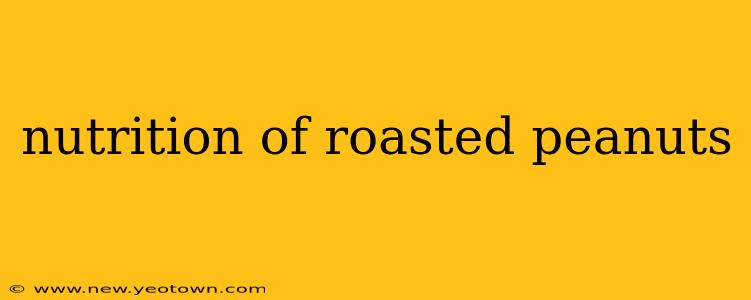Peanuts. Those humble, nutty legumes that grace everything from trail mixes to peanut butter. But beyond their delicious taste, roasted peanuts pack a surprising nutritional punch. This isn't just about satisfying a craving; it's about fueling your body with essential nutrients. Let's delve into the delightful world of roasted peanuts and uncover their nutritional secrets.
What are the health benefits of roasted peanuts?
The health benefits of roasted peanuts stem from their impressive nutrient profile. They're a powerhouse of healthy fats, protein, fiber, and various vitamins and minerals. These contribute to numerous aspects of health, from heart health to energy levels. Specifically, the monounsaturated and polyunsaturated fats in peanuts help lower LDL ("bad") cholesterol, reducing the risk of heart disease. The fiber aids in digestion and helps regulate blood sugar levels, preventing spikes and crashes. The protein provides sustained energy and supports muscle growth and repair. And don't forget the vitamins and minerals like vitamin E (a powerful antioxidant), magnesium, and potassium, all vital for overall well-being.
Are roasted peanuts good for weight loss?
This is a common question, and the answer is nuanced. While peanuts are calorie-dense, they're also incredibly satiating. The combination of healthy fats, protein, and fiber keeps you feeling full for longer, potentially reducing overall calorie intake throughout the day. However, moderation is key. Consuming excessive amounts of any food, even healthy ones like roasted peanuts, can hinder weight loss efforts. Incorporating roasted peanuts as part of a balanced diet and regular exercise regimen is more likely to support weight management goals.
How many roasted peanuts should I eat per day?
There's no magic number, as individual needs vary based on factors like age, activity level, and overall diet. However, a general guideline is to aim for a serving size of around 1 ounce (about 28 grams), which typically translates to about 28-30 peanuts. This provides a good dose of nutrients without significantly impacting your daily calorie intake. Remember to always check the nutrition label on your specific brand of roasted peanuts as serving sizes can vary.
Are roasted peanuts better than raw peanuts?
The nutritional differences between roasted and raw peanuts are relatively minor. Roasting does affect the flavor and texture, making them more palatable for many. However, roasting can slightly reduce some vitamins and antioxidants. The key is to choose peanuts that are roasted without excessive amounts of added salt or unhealthy oils.
What are the downsides of eating too many roasted peanuts?
While generally healthy, overindulging in roasted peanuts can lead to several issues. Excessive consumption can contribute to weight gain due to their calorie density. The high sodium content in some commercially roasted peanuts can negatively affect blood pressure. Finally, some individuals might experience allergic reactions to peanuts, ranging from mild discomfort to severe anaphylaxis. Always be mindful of your consumption and potential allergies.
Conclusion: A Nutritious and Delicious Treat (In Moderation)
Roasted peanuts, when enjoyed as part of a balanced diet, offer a wealth of nutritional benefits. Their combination of healthy fats, protein, fiber, and micronutrients supports various aspects of health. However, moderation is key to reaping the benefits without potential drawbacks. So, next time you reach for a handful of roasted peanuts, remember you're treating yourself to a delicious and surprisingly nutritious snack. Enjoy them responsibly, and savor the crunch!

